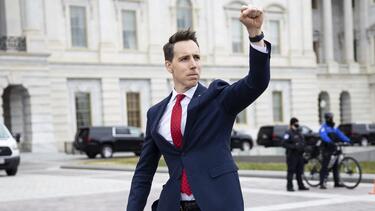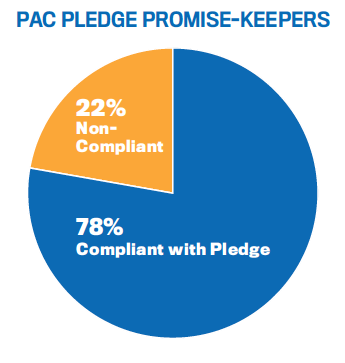A Year Later, Most CEOs Are Keeping Their Post-Insurrection Promises
Recent news stories have asserted that corporate leaders are reneging on their pledges to withhold contributions to members of Congress who voted against certifying election results on January 6, 2021. But Yale SOM's Jeffrey Sonnenfeld, who hosted one of the meetings where those pledges were made, writes that CEOs remain deeply troubled by threats to democracy, and that campaign records show that most corporate PACs aren't giving to election objectors.

Senator Josh Hawley gestures to demonstrators as he enters the U.S. Capitol on January 6, 2021.
This commentary originally appeared in Chief Executive.
A year after the worst assault on the Capitol since 1812, the companies that pledged to use their political influence to defend democracy in its aftermath are under fire. ABC News, CBS, and PBS have all trumpeted an Associated Press story charging that Fortune 500 CEOs’ commitment to withholding funding from lawmakers who voted against certifying the 2020 election results were “empty promises.” Yet, concern among big business remains very much alive.
In fact, just this past December, when I gathered roughly 200 CEOs, U.S. senators, governors and policy experts to debate the matter, I didn’t hear a lack of concern. Furthermore, a closer look at the data being bandied about to support the allegation that a vast swath of companies are reneging on their post-assault pledges reveals exactly the opposite.
“GOP Election Objectors Rake in Corporate Cash,” a recent high-profile piece in The Hill, is emblematic of how proliferating voting-rights advocates are creating confusion for CEOs looking for yardsticks for comparison and adding to the finger-pointing within their ranks. The article showcased the misguided conclusions of Accountable.US, a liberal watchdog group that charged Fortune 500 firms with “quietly resuming” their political giving to GOP election objectors.

Source: Federal Election Commission
The reality? Even though the moratorium on corporate political donations was only temporary, a deeper analysis of the actual FEC data for Q1, Q2 and Q3 shows that consistent compliance has ranged between 80 percent and 95 percent. The Q4 data is, of course, not out yet. While a handful of companies, including Boeing, did renege, the remarkable consistency—rather than those exceptions—should be the headline.
This most recent discussion showcases the perhaps intentional apples-and-oranges data confusion, likely due to underlying suspicion of corporations on the left. Skeptical media pieces pronouncing their failure flowed immediately after the commitments were made in early January 2021, before any of the FEC data came out each quarter to prove them wrong. As Mark Twain advised, “the reports of my death are premature.”
The money line and focal point in the article in The Hill seems to be “less than a year after Jan. 6th attacks, PACs associated with Fortune 500 companies and their trade groups have contributed $6.8 million to the 147 Republicans who objected.” At first blush, $6.8 million sounds impressive, but some Congressional members haul that much in on their own. Spread among 147 members, it’s a far less impressive sum—one that actually reflects diminished giving.
In fact, $6.8 million is less than 1.5% of Congressional donor support and less than one-third of one percent of total donor support to both parties this year. Corporate gifts are down, overwhelmed in magnitude by individual donor support, which currently accounts for 82% of Democratic Congressional candidate funding and 78.7% of Republican funding.
What’s more, many companies are finding themselves compelled to move beyond campaign contributions to weigh in on political and social issues directly. As Michael Dell recently stated, “If corporations cannot speak out on voting access and ballot security, what can they address?” At a recent National Investor Relations Institute forum, SVP JJ Davis explained that Dell considers four questions when deciding whether to engage in over 100 social issues that it tracks: 1) the impact on Dell’s brand and reputation (alignment with core values and past positions); 2) the external impact on key constituencies and the positions of peers; 3) the ramifications for public policy makers and 4) the ESG sentiment of employees.
Companies must make their own calls on taking stances on national and local social issues. But whatever a firm decides regarding social issues, CEOs and boards need to answer key questions based on objective facts, not ideologically based fantasy.